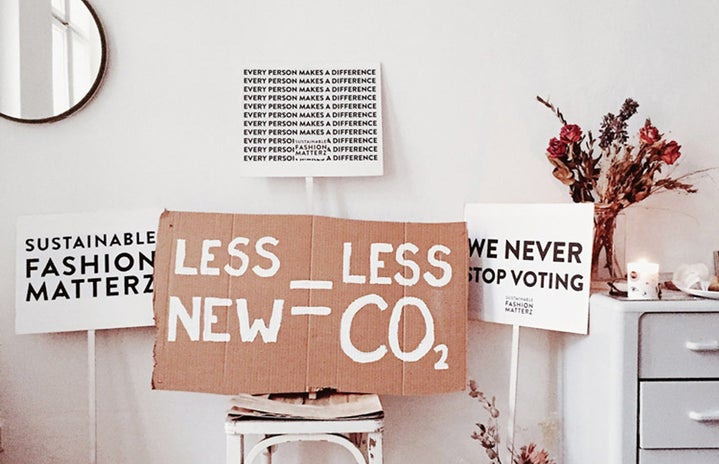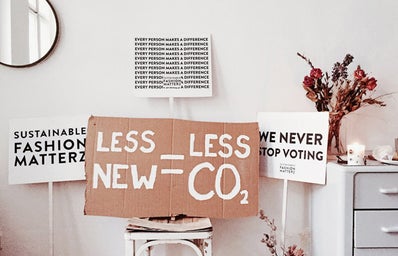Fast fashion is all around us. I wear it. My friends wear it. You probably wear it. We are all students living on a tight budget, so sometimes it is all we can afford. And that is okay.
But what is not okay, is how fast fashion can impact the planet. Sure, a new top looks great every now and then, but it doesn’t look so great for waste landfill and carbon emissions. The real problem with fast fashion is not keeping up with trends – it’s how much damage we are doing to the environment.
Clothing and footwear industry are responsible for 8% of the world’s greenhouse gas emissions – almost as much as the European Union’s entire contribution
About 60% of all clothing items end up being thrown out, just a year after they are produced. With Ireland throwing out at least 63,000 tonnes of textiles a year.
The average EU citizen owns up to 26kgs in clothing items, of which 11kg of this is thrown out. So, why are we constantly buying cheap clothes that we end up throwing out? Instead we should try and opt for better quality clothing that we can invest in and have for a longer period of time.
In recent years, fast fashion has grown to enormous lengths. The likes of Instagram and Tiktok mean we are never more than a scroll away from the latest trends. But as the world draws closer to online shopping and avoiding in store purchases, it is still doing more damage to the environment.
Even though it is more convenient, online shopping comes with just more than a new dress or jeans. Think about it – any package coming from a retailer has so many steps to go through. Packaging. Shipping. The delivery of it from one warehouse, to another, to your own home. That is a lot of carbon emissions used already. And what is even worse, is parcel returning, which doubles its impact.
For example, if we order three pairs of shoes online and return two, we are already increasing the emissions for the pair we have bought. In Germany alone, every third order is returned, which means about 250 million packages are returned each year, in just one country. Suddenly, the Boohoo wish-list does not seem as interesting.
Of course, this happens. Sometimes the shoes might be too small, or that sweatshirt just does not sit right. Sometimes we have no choice but to return an item and get our money back. What is important to note here, is that we cannot undo our climate action.
To shop more sustainably, there are so many small changes we can make in our daily shopping habits. This includes looking at the shops already on our list and seeing what changes they are making.
Some fast fashion brands such as Penney’s, H&M and more are making a move to more eco-friendly clothing as they begin to make concious clothing lines. Hopefully in the future these fast fashion brands will be fully reformed, helping us all to reduce our carbon footprint.
There are so many ways we can all try to help reduce our climate footprint. Organising swap shops with friends, going to charity or second- hand shops, re-inventing clothes you already have hanging in the back of your wardrobe.
Every now and again, we’re all going to buy fast fashion. It just happens. And that’s okay too. As long as we don’t do it too much.



